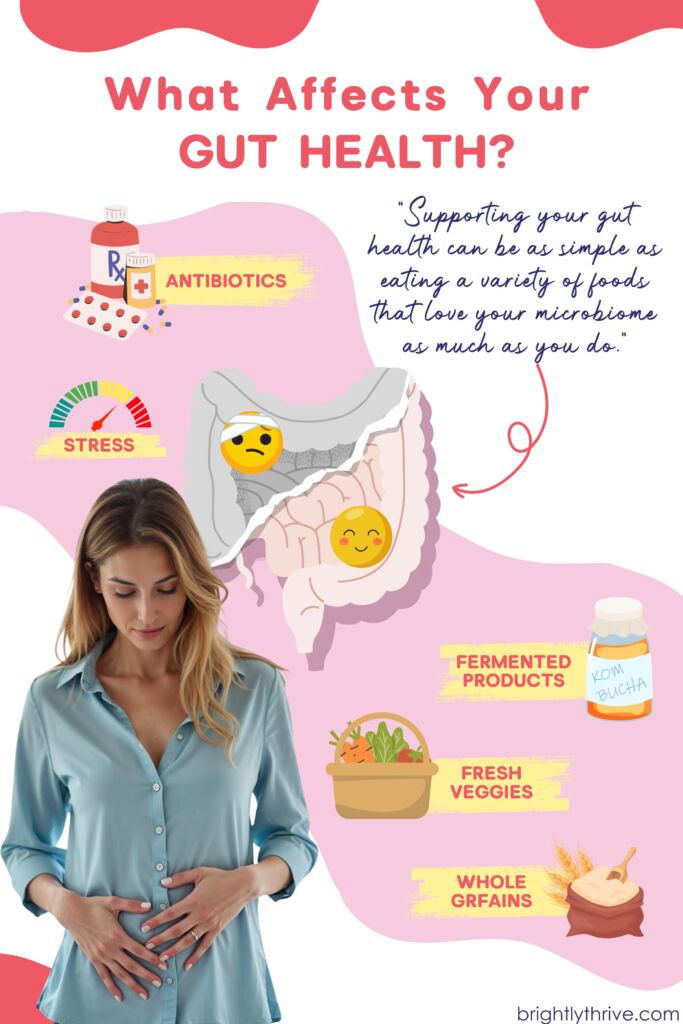
Gut Health Essentials: How Diet, Stress, and Medications Shape Your Microbiome
Gut health might seem like just another wellness buzzword, but trust us, it’s way more than that—it’s the foundation of feeling good inside and out.
Your gut microbiome is this cool, complicated ecosystem inside your body that plays a major role in keeping you healthy.
 Christina Tidwell, one of our ThriveGuides™ at BrightlyThrive™, says that it’s not just about digestion; your gut influences everything from your immune system to your mood to how your body handles energy.
Christina Tidwell, one of our ThriveGuides™ at BrightlyThrive™, says that it’s not just about digestion; your gut influences everything from your immune system to your mood to how your body handles energy.
In essence, when you look after your gut health, you’re setting yourself up for a happier, healthier you.
Let’s explore why our gut is so important to our health and healing:
Why Your Gut Microbiome Matters

Picture your gut microbiome like a bustling city full of microscopic residents working together to keep everything running smoothly.
When things are balanced, life is good. But when that balance is off, you might feel it in surprising ways—like brain fog, skin issues, or even autoimmunity.

Taking care of your gut health isn’t just about avoiding an upset stomach; it’s about keeping your whole body in harmony.
For those dealing with autoimmune conditions, the balance of your gut microbiome can be especially crucial.
A healthy gut can help manage symptoms, improve energy, and even lift your spirits.
What Affects Your Gut Health?
Your gut health is super sensitive to outside influences—things like what you eat, your stress levels, and even the medications you take.
For instance, antibiotics can be life-savers, but they also wipe out some of the good bacteria along with the bad.
Stress (hello, modern life) can mess with your gut-brain connection, making things feel all out of whack.
And as much as we need some medications, they can sometimes throw your gut off balance.
But don’t worry—being mindful of these factors gives you the power to protect and restore your gut health, even when life throws you curveballs.

Probiotics and Prebiotics: Your Gut’s Best Friends
Let’s talk about probiotics and prebiotics—two little words that can make a big difference.
Probiotics are the friendly bacteria that can help your gut run smoothly, even if they don’t stay there forever.
Prebiotics, on the other hand, are the food these friendly bacteria need to thrive. Think of them like your gut’s favorite snacks!
Foods like garlic, onions, seeds, and even your favorite fermented veggies (kimchi, anyone?) are packed with the good stuff that keeps your gut happy.
By including more of these in your diet, you’re giving your gut the support it needs to stay strong.
How to Eat for Gut Health
Supporting your gut health can be as simple as eating a variety of foods that love your microbiome as much as you do. It’s all about balance—mix in plenty of fiber-rich veggies, whole grains, and fermented goodies like sauerkraut or kombucha.
These foods help repopulate and maintain the good bacteria that keep everything in check. And don’t forget to switch it up! The more variety, the better for your gut. Trust us, your gut will thank you for the love and attention.
Take It Slow and Listen to Your Gut
When it comes to gut health, slow and steady wins the race. If you’re new to probiotic foods or supplements, start small and pay attention to how your body reacts.
Everyone’s gut is unique, and what works for one person might not be right for you. By introducing these foods gradually, you’re giving your system time to adjust without overwhelming it.
Remember, the goal is balance—so tune in to what feels good for your body and go at your own pace. You’ve got this!
Final Thoughts
In the end, gut health isn’t just about digestion—it’s about taking care of your entire well-being. From helping you manage stress to supporting your immune system and even boosting your mood, your gut microbiome is involved in so many aspects of how you feel day to day. So, why not give it some love?
If you’re ready to dive deeper into your health journey, consider joining BrightlyThrive! As a member, you’ll gain access to a supportive community, expert-led guidance, and holistic tools to help you thrive—mind, body, and gut. Together, we’ll celebrate the wins, share the challenges, and make gut health a key part of your wellness journey.

With a balanced diet, a little extra attention to the effects of medications, and a healthy dose of self-compassion, you can take charge of your gut health and feel the difference it makes. Remember, it’s all about balance and listening to your body. When your gut feels good, so do you. And that’s something worth celebrating.
References
Madison, A., & Kiecolt-Glaser, J. K. (2019). Stress, depression, diet, and the gut microbiota: human-bacteria interactions at the core of psychoneuroimmunology and nutrition. Current opinion in behavioral sciences, 28, 105–110. https://doi.org/10.1016/j.cobeha.2019.01.011
Warren, M. F. a. M. (2023, January 24). How gut bacteria are controlling your brain. https://www.bbc.com/future/article/20230120-how-gut-bacteria-are-controlling-your-brain
Patangia, D. V., Ryan, C. A., Dempsey, E., Ross, R. P., & Stanton, C. (2022). Impact of antibiotics on the human microbiome and consequences for host health. MicrobiologyOpen, 11(1). https://doi.org/10.1002/mbo3.1260
Bsn, M. D. R. (2024, January 29). Signs of an Unhealthy Gut and What to Do About It. Healthline. https://www.healthline.com/health/gut-health
Els, L. C. (2024, May 15). Prebiotics: Understanding their role in gut health. Harvard Health. https://www.health.harvard.edu/nutrition/prebiotics-understanding-their-role-in-gut-health
TAGS:
CATEGORIES:






